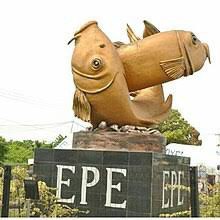THE HISTORY OF EPE
Prior to the arrival of people and settlements in Epe, the town was referred to as “Igbo Obo,” which translates into English as “Monkey Forest.”
Urankaloye and Aramope led several groups of Ijebu hunters on a game expedition to this area. Their presumed residence prior to embarking on their game expedition from Ijebu-Ode was Ile-Ife. Urankaloye received a message from an Ifa divination that he should travel south towards the lagoon and settle somewhere between the sixth and seventh rivers’ confluences.
Crossing the fifth river, “Oterin,” which translates as “Cold Water,” Uraka which is the abbreviation for Urakanloye, then proceeded to a location designated as “Poka,” where he struck the ground with his popoka stick. Poka town was named after his popoka stick. At Poka, the Ifa oracle was consulted again for guidance, and Uraka proceeded, eventually settling in a place called “ETITA” after crossing the sixth river.
Uraka noticed smoke coming from a dense forest towards the lagoon after settling at Etita. And, to be certain of what he was seeing, Uraka tracked the smoke’s source to a fishing village where he met Opute, Lugbasa, Alaro, and Ogunmude.
Alaro and Ogunmude were married but had no children. Both later became deities and continue to be worshiped in Epe. As a result, all of Epe’s sons and daughters are known as “Omo Epe Alaro Ogunmude.”
The current location of the Lagos State University’s School of Engineering was originally the Igbo Obo (monkey forest) where Uraka continued his hunt for games. He later discovered a location known as Oko-Eepe (forest of black ants). As it turned out, Uraka always returned home empty-handed whenever he set his traps for games. This caused him and his wife concern. Nonetheless, he was convinced that Oko-Eepe was the site of the world’s greatest games as at that time. He complained to his wife, “Peeta,” that the forest was infested with black ants and that whenever he thumbed his feet to ward them off, the animals around him bolted. Additionally, any animal caught in his traps was always devoured by the ants before he arrived.

In the 15th century, Eepe Town was named after Oko-Eepe, and some historians believe Peeta, Uraka’s wife, was instrumental in the town’s naming. Within a short period of time, some settlers established themselves at Areke or Aleke, while others established themselves on the opposite side, dubbed “Apakeji.” Along the way, an Ijebu prince, Obaloja, son of Ijebu-Ode’s Awujale, left Ijebu-Ode and settled in Epe. He adopted the name Oloja, and by 1790, Shagbafara had succeeded as Oloja.
Epe was a fairly large town in 1810. Although the town was relatively peaceful, it did experience its share of inter-tribal conflict. However, the Makun-Omi-Epe war occurred in 1848. King Kosoko of Lagos sought refuge in Epe Land with over 1,500 followers almost immediately after the Makun-Omi-Epe war ended. That was in December 1851, during Oloja Olumade’s reign.
Kosoko was denied entry into Epe town following a lengthy appeal, but after a lengthy delay, he was directed to Ijebu-Ode to seek clearance and permission from Awujale Anikilaya. As a result, the Awujale regarded him as a mark of royalty and sent “Oja Ikale” to Oloja Olumade as a symbol of permission and care, pleading with him to grant Kosoko and his lieutenants asylum in Epe.
Kosoko was pardoned and returned to Lagos in 1862. The majority of his followers, including his daughter Kusade, left with him, leaving behind his grandson Adenusi. Adenusi’s family has continued to multiply in Epe to this day. Those left behind by Kosoko made up the majority of what is now known as Epe Eko. In 1892, Epe served as the embarkation point for Sir Gilbert Carter’s military expedition to Ijebu-Ode to defeat the Awujale (the Ijebu political and spiritual ruler).
Epe now serves as a hub for the export of fish, cassava, maize, and cocoa to Lagos.
Special leaves useful in preserving kola nuts are trucked to Ijebu-Ode, Shagamu, and the other main kola-shipping towns.
Epe is best known for its construction of the motorized, shallow-draft barges that navigate the coastal lagoons. The primary occupation is fishing. The town is served by secondary schools, several hospitals, and a health office. They are well-known for their fishing.
